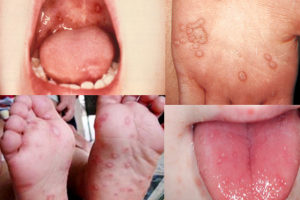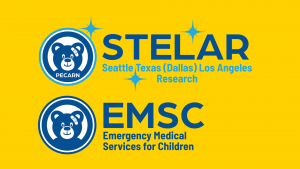Originally published at Pediatric EM Morsels on April 20, 2018. Reposted with permission.
Follow Dr. Sean M. Fox on twitter @PedEMMorsels
Children have very few responsibilities and even fewer jobs (just ask my kids). The one job young children have is growing. We have discussed some Growth and Development topics previously (ex, Milestones, Infant Formula, Growth Estimates). Occasionally, that single job of growth becomes too difficult to achieve. Let’s briefly review some of the issues we should consider (yes, even in the Emergency Department) when we are dealing with a child who has has Failure to Thrive:
Failure to Thrive: Definition
- Failure to Thrive (FTT) describes growth failure primarily based on weight or rate of weight gain.
- As condition persists, FTT can also include length and head circumference deficits.
- FTT is associated with cognitive, behavioral, and constitutional consequences.
- Growth is compared to growth percentile curves (see CDC.gov).
- Definitions may vary between groups, but FTT in a child can be described as: [Zenel, 1997]
- < 2 yrs child with weight < 3rd-5th percentile on more than one occasion.
- < 2 yrs child who has weight < 80% of ideal weight for age.
- < 2 yrs child whose weight crosses two Major Percentiles downward (using 90th, 75th, 50th, 25th, 10th, and 5th percentiles).
- Does not include patients who:
- Have short stature genetically.
- Are small for gestational age infants.
- Are preterm infants.
- Were “overweight” and height gain increased while weight gain decreased.
- Normal variations in growth do occur and may appear to met these criteria.
Failure to Thrive: Considerations
- Failure to Thrive is NOT a diagnosis.
- Failure to Thrive is often Multifactorial! [Block, 2005]
- Poverty is the greatest single risk factor for FTT worldwide.
- Often involves some combination of organic disease and behavioral dysfunction.
- Can certainly also involve child neglect or abuse. [Block, 2005]
- Typically, the conditions that lead to FTT are divided into “Organic” vs “Non-organic” causes.
- This is, conceptually, helpful, but not accurate as there is much overlap between the two. [Larson-Nath, 2018; Zenel, 1997]
- “Non-organic” – typically warrant behavioral interventions.
- “Organic” – typical require medical interventions.
- Additionally, while the primary cause may be an “organic” one, it can become exacerbated by “non-organic” causes.
- This is, conceptually, helpful, but not accurate as there is much overlap between the two. [Larson-Nath, 2018; Zenel, 1997]
- Calories Count and discerning whether the patient has one or a combination of the following will be helpful in determining a useful evaluation strategy. [Rabago, 2015; Zenel, 1997]
- Inadequate Calorie Intake
- Often has psychosocial component, but it is not just simply poor feeding…
- Poor appetite may be related to organic disease too (ex, anemia).
- Difficulty ingestion can also be related to congenital conditions (ex, dyspnea related to congenital heart disease, TE-fistula)
- Obviously, vomiting for GI mechanical abnormalities is not going to allow appropriate caloric intake.
- Inadequate Calorie Absorption
- Often has psychosocial component, but while we may want to blame the formula and “protein sensitivity”, be aware…
- Malabsorption due to inflammatory bowel disease, celiac disease, or cystic fibrosis can play a role.
- Excessive Calorie Expenditure
- Often related to organic diseases…
- Anything that increases the metabolic demands will increase caloric requirements (ex, hyperthyroidism, chronic respiratory disease, congenital heart disease).
- Defective use of available calories, such as seen with inborn errors of metabolism, can also present with FTT. [Rabago, 2015]
- These patients may still improve weight gain with behavioral modifications (so cannot use weight gain during hospitalization as a discriminating tool to “rule-out” organic causes). [Zenel, 1997]
- Inadequate Calorie Intake
Failure to Thrive: Evaluation
- With a vast differential and list of possible causes, the evaluation and work up can be equally diverse and broad.
- Reflexive lab testing and imaging are NOT useful. [Larson-Nath, 2018; Zenel, 1997]
- The evaluation should be predicated on a thorough History and Physical. [Larson-Nath, 2018]
- Discovered formula mixing errors? Perhaps caloric intake has been inappropriately low. Wise to check a sodium and glucose level though!
- Hepatomegaly? Perhaps inborn errors of metabolism or congenital heart disease is the etiology.
- Dysmorphic features? Consider underlying genetic or congenital abnormalities. [Rabago, 2015]
- Parental depression, marital strife, divorce? Consider Non-accidental Trauma. [Block, 2005]
- Hx of parental substance/ETOH abuse? Consider Non-accidental Trauma. [Block, 2005]
- Bruising that is not appropriate for developmental stages or not over bony prominences? Again… consider Non-accidental Trauma.
- Significant family history? Cystic Fibrosis? HIV exposure?
- Lab and radiographic evaluations should be based on H+P, but occasionally, there is still not a clear cause. [Zenel, 1997]
- Screening labs to assess for the potential for occult organic causes is reasonable.
- CBC with Differential – anemia, pancytopenia?
- Chemistry panel – sodium derangement, hyperkalemia, acidosis, renal impairment?
- Urinalysis and Urine Culture – occult urinary tract infection, reducing substances?
- With evidence of severe malnutrition, may also be helpful to know:
- Albumin level
- Calcium and phosphorus levels (Rickets?)
- Alkaline phosphatase
- Screening labs to assess for the potential for occult organic causes is reasonable.
- Some children with FTT will benefit from hospitalization to help ensure appropriate caloric assessments can be made.
- Normal, healthy infants require ~100 kcal/kg/Day.
- “Catch up” growth will require more than baseline requirements.
- ~50% more on average is required.
- ~150 kcal/kg/Day would, therefore, be necessary.
- Having a nutritionist involved to help assess the patient’s true needs and how best to achieve them is helpful!
- Children with organic causes typically have longer hospital stays and lower daily weight gain (but do gain weight). [Larson-Nath, 2018]
- Just because a child has improvement in weight gain with increased caloric intake, this does not mean there is no organic cause.
- These children require long-term, close follow-up.
- Hospitalization will not typically resolve the issue completely.
- Hospitalization may not even discover the etiology.
- Many times numerous sub-specialists will end up evaluating these children, often, still with the final diagnosis of “non-organic” cause.
- Obviously, this process can be frustrating for the family. Anticipate this and don’t minimize it.
Moral of the Morsel
- Failure to Thrive is NOT a diagnosis. Ask the question: “Why?”
- It’s about caloric balance! Consider reasons for increased calorie expenditure, not just decreased caloric intake.
- Be a super sleuth! Look for clues that can help direct the evaluation!
References
Larson-Nath C1, St Clair N1, Goday P1. Hospitalization for Failure to Thrive: A Prospective Descriptive Report. Clin Pediatr (Phila). 2018 Feb;57(2):212-219. PMID: 28952374. [PubMed] [Read by QxMD]
Larson-Nath CM1, Goday PS. Failure to Thrive: A Prospective Study in a Pediatric Gastroenterology Clinic. J Pediatr Gastroenterol Nutr. 2016 Jun;62(6):907-13. PMID: 26720767. [PubMed] [Read by QxMD]
Larson-Nath C, Biank VF. Clinical Review of Failure to Thrive in Pediatric Patients. Pediatr Ann. 2016 Feb;45(2):e46-9. PMID: 26878182. [PubMed] [Read by QxMD]
Rabago J, Marra K, Allmendinger N, Shur N. The clinical geneticist and the evaluation of failure to thrive versus failure to feed. Am J Med Genet C Semin Med Genet. 2015 Dec;169(4):337-48. PMID: 26581677. [PubMed] [Read by QxMD]
Nourbakhsh N1, Rhee CM, Kalantar-Zadeh K. Protein-energy wasting and uremic failure to thrive in children with chronic kidney disease: they are not small adults. Pediatr Nephrol. 2014 Dec;29(12):2249-52. PMID: 25239300. [PubMed] [Read by QxMD]
Olsen EM1. Failure to thrive: still a problem of definition. Clin Pediatr (Phila). 2006 Jan-Feb;45(1):1-6. PMID: 16429209. [PubMed] [Read by QxMD]
Block RW, Krebs NF; American Academy of Pediatrics Committee on Child Abuse and Neglect; American Academy of Pediatrics Committee on Nutrition. Failure to thrive as a manifestation of child neglect. Pediatrics. 2005 Nov;116(5):1234-7. PMID: 16264015. [PubMed] [Read by QxMD]
Zenel JA Jr1. Failure to thrive: a general pediatrician’s perspective. Pediatr Rev. 1997 Nov;18(11):371-8. PMID: 9360433. [PubMed] [Read by QxMD]









